Are We Witnessing an Inflection Point in Global Research? Why Research in 2025 Will Be a Turning Point for Science

What happens when a nation produces nearly twice as many research papers as its closest competitor? We must ask ourselves whether the sheer volume of research output is reshaping not just academic rankings, but the very nature of global scientific discourse. This paradigm shift raises profound questions about how knowledge is created, validated, and shared across borders. Are we witnessing a new era in global scientific leadership, or is this unprecedented concentration of global research a signal that our international scientific community needs to evolve? Recent publication data from Scinapse reveals not just changing patterns in global research output but hints at a fundamental restructuring of the global knowledge economy that could redefine how humanity tackles its greatest challenges.

Top 10 Countries With the Most Research Publications
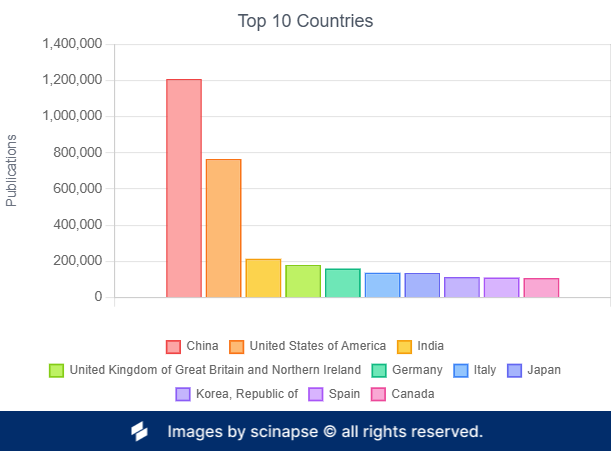
China dominates, with over 1.2 million publications, far exceeding the United States (766,213) in second place. India, the United Kingdom, Germany, and Italy follow with much lower publication counts. However, the story goes beyond raw numbers.
The presence of multiple Chinese institutions among the top global research affiliations, including the Chinese Academy of Sciences, Zhejiang University, and Sichuan University, demonstrates that this is not just about quantity but also about developing robust research ecosystems.
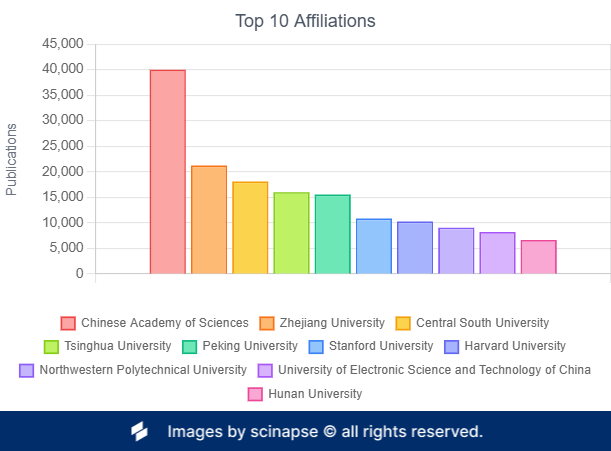
This shift represents a fundamental realignment of global scientific power. China's global research profile isn't just about publications; it reflects decades of strategic investment in scientific infrastructure, human capital development, and a national commitment to technological self-sufficiency. The implications of this transition extend far beyond academia, potentially reshaping global innovation networks, technical standards, and the future direction of scientific inquiry.
Research Fields With Most Publications in 2024
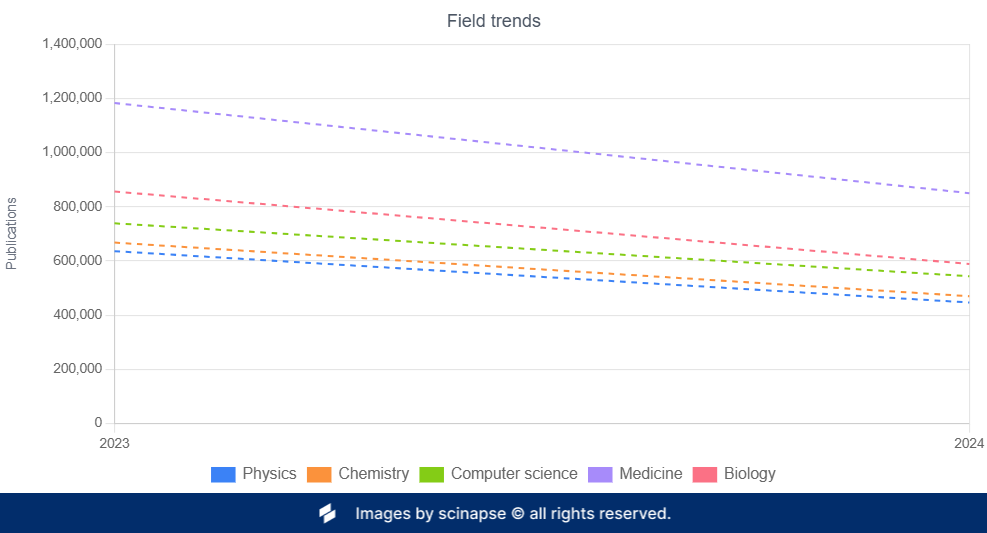
The publication data across different research fields reveals intriguing patterns. Medicine leads with 850,237 publications, followed by Biology (589,094), Computer Science (543,791), Chemistry (470,154), and Physics (446,892). However, the downward trend across all fields from 2023 to 2024 suggests a potential consolidation phase in global research output.
Medicine and Biology
The dominance of medicine (850,237 publications) and biology (589,094 publications) in the global research output reveals more than just numerical superiority—it reflects a fundamental shift in how we approach human health and biological understanding. This commanding presence, accounting for over 1.4 million publications combined, signals several key developments:
- Integration of Healthcare Innovation: The high volume of medical research publications demonstrates a global response to emerging health challenges, from infectious diseases to chronic conditions. This surge isn't merely reactive; it represents a proactive transformation in how we approach healthcare delivery and medical innovation.
- Technological Convergence: The substantial overlap between medical and biological research signifies breaking traditional boundaries between these fields. We're witnessing the emergence of biomedicine as a unified discipline, where fundamental biological discoveries and vice versa increasingly inform clinical applications.
- Precision Medicine Revolution: The robust life sciences ecosystem is particularly evident in the rise of personalized medicine research. This isn't just about genetic testing—it encompasses everything from biomarker discovery to targeted therapeutics, suggesting a fundamental shift toward individualized healthcare approaches.
Computer Science
Computer science's position with 543,791 publications goes beyond traditional technological boundaries. Its strategic placement in the global research landscape reflects several critical trends:
- Digital Transformation Vector: The field's strong showing relative to other disciplines indicates its role not just as a standalone discipline, but as a fundamental driver of innovation across all scientific domains. This reflects the increasing digitalization of research methodologies across all fields.
- Algorithmic Revolution: The high publication volume in computer science suggests an acceleration in areas like artificial intelligence and machine learning, which are increasingly becoming essential tools in other fields' research methodologies.
- Infrastructure Evolution: The robust global research output points to the development of new computational frameworks and tools that are reshaping how other sciences conduct their investigations, from climate modeling to drug discovery.
Chemistry and Physics
While chemistry (470,154 publications) and physics (446,892 publications) show comparatively lower publication volumes, these metrics tell only part of the story:
- Quality-Focused Evolution: The more moderate publication numbers in these fields reflect a mature global research ecosystem where impact often matters more than volume. These fields frequently produce fewer but more foundational papers that shape entire research domains.
- Technological Enablers: Despite lower publication counts, these disciplines continue to provide the theoretical and practical foundations for breakthrough technologies. From new materials science to quantum computing, chemistry, and physics research underpins many of the most promising technological advances.
- Interdisciplinary Impact: The relatively stable publication numbers mask these fields' growing influence in interdisciplinary global research. Chemical principles in drug development and physical concepts in renewable energy represent just a fraction of these sciences' broader impact.
- Methodological Innovation: Both fields are experiencing a renaissance through the integration of advanced computational methods and AI-driven research tools, suggesting that while publication volumes may be lower, the nature and scope of global research is evolving significantly.

Research Field Predictions for 2025
Medicine and Healthcare: The Digital Health Revolution
As we approach 2025, medical research is poised to reach unprecedented levels, with projections exceeding 900,000 publications annually. This surge will largely be driven by the revolutionary integration of artificial intelligence into healthcare systems. We're witnessing the emergence of sophisticated diagnostic algorithms capable of detecting disease patterns before conventional symptoms appear, while neural networks are dramatically reducing drug discovery timelines by up to 50%. The landscape of clinical research is undergoing a fundamental transformation, with cloud-based platforms managing multi-site trials and wearable technology generating continuous health data for longitudinal studies. Perhaps most significantly, the field is seeing a renewed focus on mental health and aging research, with novel neuroimaging techniques enabling early detection of neurodegenerative conditions and precision psychiatry approaches leveraging genetic and environmental data for personalized treatment strategies.
The integration of digital health technologies is reshaping medical research methodology. Blockchain applications are revolutionizing secure health data sharing, while virtual and augmented reality platforms are transforming medical training and therapy. The advancement of 5G and upcoming 6G technologies is pushing the boundaries of telemedicine capabilities, creating new possibilities for remote patient care and monitoring. This digital transformation is not just changing how we conduct research but is fundamentally altering our approach to healthcare delivery and patient engagement.
Biology: Genomics and Environmental Frontiers
The biological sciences are expected to maintain strong growth, with publications projected to reach 600,000 annually by 2025. The field is experiencing a renaissance in genomics and synthetic biology, with CRISPR-based therapeutic applications moving into late-stage clinical trials and the development of synthetic chromosomes for specialized cellular functions. These advances are complemented by the emergence of engineered microorganisms designed for environmental remediation and industrial applications, signaling a shift toward practical applications of synthetic biology.
Environmental biology is taking center stage as researchers deploy high-resolution ecosystem mapping using satellite data and ground sensors to understand and address climate change impacts. Studies on species adaptation to rapid environmental changes are becoming increasingly urgent, while marine biology research is delving deeper into the effects of ocean acidification. The integration of computational methods is accelerating these advances, with quantum computing being applied to protein folding predictions and machine learning models enhancing our understanding of complex ecological systems.
Computer Science: IoT and Smart Integration
Computer science research is projected to reach 580,000 publications annually, with quantum computing emerging as a major frontier. Researchers are making significant strides in error-correction algorithms for quantum systems and developing hybrid classical-quantum computing architectures. The field is simultaneously grappling with crucial ethical considerations, as evidenced by the growing body of research on algorithmic accountability, AI bias mitigation, and privacy-preserving computation techniques.
The cross-pollination of computer science with other disciplines is creating new research territories. AI systems specialized for scientific discovery are accelerating research across fields, while advanced natural language processing is revolutionizing how we synthesize and analyze research findings. Edge computing applications are expanding into IoT and smart cities, creating new paradigms for distributed computing and data analysis.
Chemistry: Sustainability and Smart Materials
Chemistry research, projected to reach 500,000 publications annually, is increasingly focusing on sustainable solutions and practical applications. The development of novel catalysts for CO2 conversion and utilization is gaining momentum, alongside breakthroughs in biodegradable plastics and green synthesis methods for pharmaceutical compounds.
Energy applications remain a crucial focus, with researchers pursuing next-generation battery materials and improved solar cell efficiency. The field is also seeing significant advances in drug delivery systems, with smart materials and biodegradable nanocarriers opening new possibilities for targeted therapeutic approaches.
Physics: Quantum Advances and Energy Solutions
Physics research, while maintaining a steady output of around 470,000 publications annually, is pushing boundaries in quantum technologies and energy solutions. Quantum sensors for precision measurements and quantum communication networks are moving from theoretical concepts to practical applications. The field's contribution to energy research is particularly noteworthy, with advanced nuclear fusion reactor designs and high-efficiency photovoltaic materials showing promise.
Space science continues to expand our understanding of the universe, with improved gravitational wave observation techniques and advanced propulsion system research paving the way for future space exploration.
How Will the Global Scientific Community Evolve in 2025?
While China's rise is remarkable, the current concentration of global research output between China and the United States presents both opportunities and challenges for the global scientific community. This duopoly in global research production raises important questions about diversity in scientific thought, methodology, and priority-setting. When two countries dominate the research landscape so thoroughly, how does this affect the global scientific agenda? What voices and perspectives might be inadvertently marginalized?
The significant gap between these two leaders and other major research nations like India, the United Kingdom, and Germany suggests a potential vulnerability in the global scientific ecosystem.
A diverse global research ecosystem is better equipped to tackle global challenges, spot emerging opportunities, and develop innovative solutions that work across different contexts.
Critical Implications for Research Stakeholders in 2025
For Research Institutions
The evolving research landscape demands fundamental changes in how institutions operate and strategize. Academic institutions must prioritize international partnerships not just as auxiliary relationships, but as core components of their research strategy. This means developing robust frameworks for international collaboration, including shared research facilities, joint funding mechanisms, and streamlined processes for international student and faculty exchanges.
Key points to consider:
- Reconfigure traditional departmental structures to promote cross-disciplinary work.
- Steps to foster interdisciplinary research:
- Establish dedicated interdisciplinary research centers.
- Implement flexible funding models for cross-department projects.
- Develop evaluation metrics that value collaborative research efforts.
- Go beyond basic connectivity to meet advanced research needs:
- Invest in a high-performance academic search engine and secure data-sharing platforms.
- Utilize AI-powered research management systems and virtual reality tools for remote collaboration.
- Formulate comprehensive data management strategies:
- Address privacy and security concerns.
- Support open science initiatives.
For Research Managers
Research managers face unique challenges in coordinating increasingly complex global research portfolios. They must develop expertise in managing distributed teams across multiple time zones and cultures, requiring new approaches to project management and team coordination.
Key responsibilities will include:
- Implementing adaptive management frameworks that can respond quickly to changing research priorities
- Developing metrics and evaluation systems that accurately assess interdisciplinary research impact
- Creating effective knowledge management systems to capture and share research insights across teams
- Building and maintaining relationships with diverse stakeholders, from funding agencies to industry partners
- Ensuring compliance with evolving international research regulations while maintaining research efficiency
For Corporate Researchers
Corporate researchers will need to navigate an increasingly complex landscape where industry and academic boundaries blur. Their role will evolve to include:
Strategic Research Planning
- Aligning research objectives with both commercial goals and broader societal needs
- Developing frameworks for effective academia-industry collaboration
- Creating flexible research programs that can quickly adapt to market changes
- Establishing ethical guidelines for corporate research that maintain public trust
Knowledge Translation
- Converting academic research into commercially viable products and services
- Developing mechanisms for rapid prototyping and testing of global research outcomes
- Creating effective channels for sharing research findings with academic partners
- Building systems for protecting intellectual property while promoting open innovation
For Policymakers
Policymakers must develop more sophisticated approaches to research governance and funding. Their focus should extend beyond traditional funding allocation to include:
Strategic Planning and Funding
- Developing nuanced funding mechanisms that promote both national excellence and international collaboration
- Creating regulatory frameworks that protect national interests while fostering global scientific cooperation
- Implementing policies that support the development of research infrastructure across different regions
- Establishing mechanisms for rapid funding deployment in response to emerging research priorities
Talent Development and Retention
- Creating immigration policies that facilitate international researcher mobility
- Developing incentive systems to attract and retain top research talent
- Supporting early-career researchers through targeted funding and development programs
- Establishing frameworks for international research training and exchange programs
For Individual Researchers
Researchers must develop a broader range of competencies beyond their specific field of expertise:
Technical and Methodological Skills
- Mastery of advanced digital research tools and platforms
- Proficiency in data analysis and visualization techniques
- Understanding of AI and machine learning applications in research
- Ability to work with large datasets and complex computational models
Collaborative and Communication Skills
- Expertise in virtual collaboration and remote team management
- Cultural competency for effective international collaboration
- Skills in translating research for different audiences
- Ability to work effectively in interdisciplinary teams
Strategic Career Management
- Understanding of research funding landscapes and grant writing
- Knowledge of intellectual property rights and research commercialization
- Ability to build and maintain professional networks across sectors
- Skills in personal brand building and research impact maximization
For Industry Partners
Industry stakeholders must develop new approaches to research engagement:
Partnership Development
- Creating flexible models for academia-industry collaboration
- Developing frameworks for shared intellectual property management
- Building long-term relationships with research institutions
- Establishing mechanisms for knowledge transfer and commercialization
Resource Allocation
- Balancing internal research capabilities with external partnerships
- Investing in shared research infrastructure
- Supporting early-stage research while maintaining a commercial focus
- Developing talent pipelines through academic partnerships
What Next for Research in 2025?
Research in 2025 will likely be more complex, more connected, and more dynamic than ever before. While China's dominance in global research output is likely to continue, the emergence of new research powers and the increasing importance of international collaboration suggest a more nuanced future. Success in this evolving landscape will require adaptability, strategic foresight, and a commitment to fostering diverse and resilient research ecosystems.
The challenge ahead is about ensuring that global research output translates into meaningful solutions for global challenges. As we move toward 2025, the ability to navigate this changing landscape while maintaining scientific excellence and fostering genuine innovation will be crucial for researchers, institutions, and nations alike.

Author: Uttkarsha B
- AI-Ethicist and STM Research & Publishing Expert
Never re-search again.
Scinapse is made by researchers for researchers.
Join the next generation of research at ⏯️ https://scinapse.io/
Pluto Labs
Pluto Labs helps researchers focus on their research by improving several inefficiencies in the academic research process. We offer data-driven insights from academic papers, allowing users to easily obtain review-level results for their desired range of papers.
https://pluto.im/

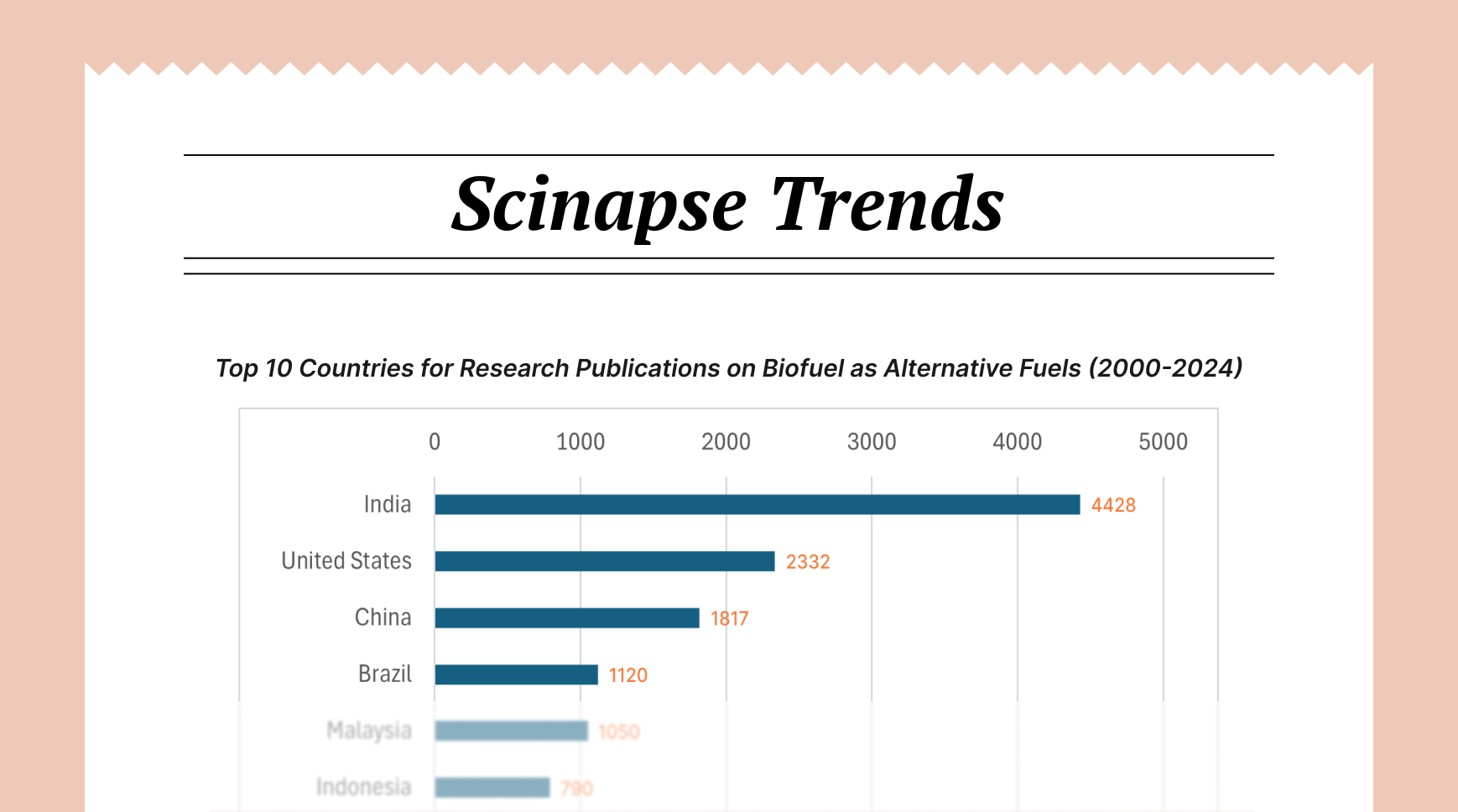
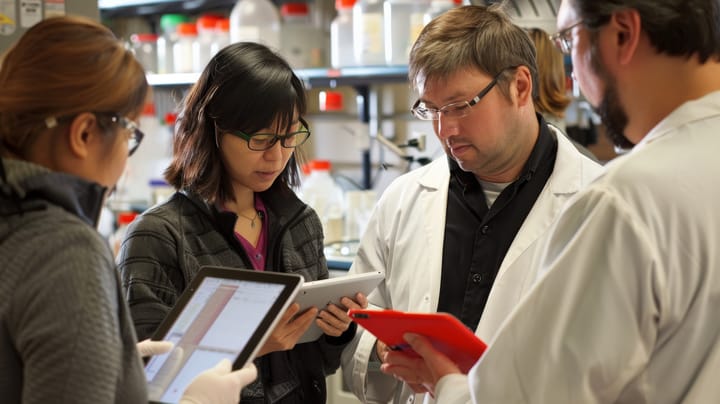


Comments ()